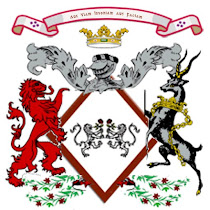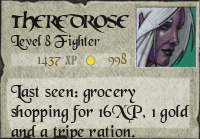
Certainly as the patron of the Caledon 1st Lancers - Loch Avie's Own; a member of the Caledon Militia, Navy, and the head of MI5, I lend full support to my typist, who has been inspired to write the following OOC note.
****
It has been my privilege to know many men and women who are serving- or have served - their countries in the armed forces. My own husband was in the United States Navy for 13 years, and his father, an Army First Sergeant, served in the Pacific Theater during World War II.
My mind has now turned a little further back in time, however, as I had the honor of walking a small portion of the Gettysburg National Battlefield recently during some time spent otherwise in that town. It was merely on the spur of the moment that I decided that I would drive through the "car tour" portion of the Battlefield. It was a cold, rainy day. Much different than the hot summer day that the men of the Union and Confederate Armies experienced in the wool of their uniforms so many years ago. I stuck to the car as I looked all around me - the monuments standing tall and proud in the dreary day - until I began to wind up the hill at Little Round Top. There I saw the sign for the 20th Maine. I knew I needed to park the car and get out for a look.
For those who have read any history about the battle at Gettysburg, or have ever read Killer Angels (or seen the movie, Gettysburg based on this book), you will recognize that the 20th Maine were pivotal in the Union Victory at Gettysburg.
I grabbed my umbrella and stepped out of the car. There were a number of buses with school groups and tourists stopped here as well. I walked through the woods at the top of this little hill and a great reverence fell over me as I realized that I was walking in the footsteps of these brave souls...imagining what horrors they experienced that day (and the many days before and after). What was running through their minds as they fought and fought? I listened to the guides all around me catching snippets of information here and there as the tours groups got their lessons.
There was one gentleman very near me, who was quite an able teacher, and I found that I learned much about the battle listening to him as I stood looking over the low rock wall, which the 20th had created. I learned how the rebels tried to take the hill many times, and at the last when Chamberlain (Commander 20th Maine) and his men were nearly out of ammunition, he staged one last defense. Described here in his own words:
"Not a moment was about to be lost! Five minutes more of such a defensive and the last roll call would sound for us! Desperate as the chances were, there was nothing for it but to take the offensive. I stepped to the colors. The men turned towards me. One word was enough- 'BAYONETS!' It caught like fire and swept along the ranks. The men took it up with a shout, one could not say whether from the pit or the song of the morning sat, it was vain to order 'Forward!'. No mortal could have heard it in the mighty hosanna that was winging the sky. The whole line quivered from the start; the edge of the left-wing rippled, swung, tossed among the rocks, straightened, changed curve from scimitar to sickle-shape; and the bristling archers swooped down upon the serried host- down into the face of half a thousand! Two hundred men!
"It was a great right wheel. Our left swung first, the advancing foe stopped, tried to make a stand amidst the trees and boulders, but the frenzied bayonets pressing through every space forced a constant settling to the rear. Morrill with his detached company and the remnants of our valorous sharpshooters... now fell upon the flank of the retiring crowd. At the first dash the commanding officer I happened to confront, coming on fiercely (with) sword in hand and big navy revolver (in) the other, fires one barrel almost in my face. But seeing the quick saber point at his throat, reverses arms, gives sword and pistol into my hands and yields himself prisoner.
"Ranks were broken; some retired before us somewhat hastily; some threw their muskets to the the ground- even loaded; sunk on their knees, threw up their hands calling out, 'We surrender. Don't kill us!' As if we wanted to do that! We kill only to resist killing. And these were manly men, whom we could befriend and by no means kill, if they came our way in peace and good will."

Joshua Lawrence Chamberlain
1828-1914
Lieutenant Colonel, Colonel, 20th Maine Volunteer Infantry
Brigadier General, U.S. Volunteers
Brevet Major General, U.S. Volunteers
Congressional Medal of Honor
Governor of Maine, 1866-1870
President, Bowdoin College, Brunswick, Maine 1871-1883
American Commissioner, Universal Exposition at Paris, 1871
It was in 1954 that President Eisenhower changed that name of Armistice Day to Veteran's Day with a proclamation, which included the following words:
Now, Therefore, I, Dwight D. Eisenhower, President of the United States of America, do hereby call upon all of our citizens to observe Thursday, November 11, 1954 , as Veterans Day. On that day let us solemnly remember the sacrifices of all those who fought so valiantly, on the seas, in the air, and on foreign shores, to preserve our heritage of freedom, and let us reconsecrate ourselves to the task of promoting an enduring peace so that their efforts shall not have been in vain....
In order to insure proper and widespread observance of this anniversary, all veterans, all veterans' organizations, and the entire citizenry will wish to join hands in the common purpose.
Truly on this day, I send my deepest expression and gratitude for all who have defended, cared for, fought for, and guided our countries and our peoples. I shall whisper a prayer for all who have sacrificed (military and civilian), fought (and continue to do so) for us on the seas, in the air, at home, and on foreign soil.
*bows with hand over her heart*
May you be blessed.
****
for more information about the 20th Maine and the Battle of Gettysburg, you may wish to begin your learning here at the National Park Service site.




1 comments:
Ah, Duchess.. I know of the spot you speak of and my typist has stood there more than a few times. It never fails to bring a lump to my throat. I look on that conflict as a terribly tragedy, as all civil wars tend to be. Yet one cannot help but be affected when standing on these spots where the actual battle was fought.
My typist is descended from two men who fought with the Irish Brigade in the 69th Infantry Volunteer militia. By the time Gettysburg was fought, the proud force of Irish immigrants that had marched out of New York had dwindled greatly, particularly after the disaaster of Fredericksburg, which reduced the entire Irish Brigade from 1600 men to 256. The Irish Brigade's contribution to the battle is memorialized HERE, in a simple, but beautiful, Celtic cross. I try to include a visit to the brigade's cross every time I am near Gettysburg.
Wonderful post, ma'am, perfectly in context. I join you in your thanks to ALL service men and women for their contributions to their country. Without them we would not enjoy the liberties we take for granted every day.
Post a Comment